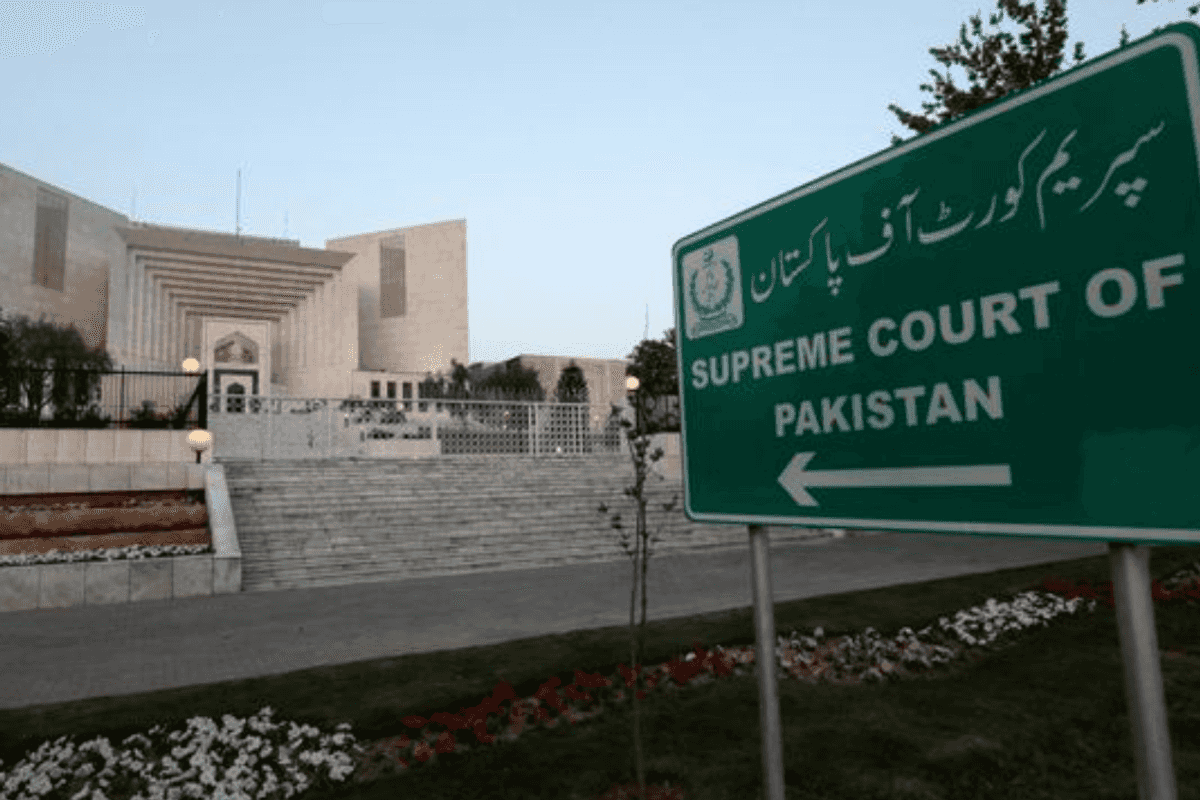Pakistan’s top court raises concerns over transparency in military court trials of civilians
'What is the problem in granting civilians the right to appeal?' asks SC judge.

Aamir Abbasi
Editor, Islamabad
Aamir; a journalist with 15 years of experience, working in Newspaper, TV and Digital Media. Worked in Field, covered Big Legal Constitutional and Political Events in Pakistan since 2009 with Pakistan’s Top Media Organizations. Graduate of Quaid I Azam University Islamabad.

An outside view of the Supreme Court of Pakistan building in Islamabad.
Reuters
Pakistan’s top court voiced concerns on Wednesday over the transparency and accountability of trying civilians in military courts, as it resumed hearing on the case.
The case revolves around the military's prosecution and recent convictions of civilians accused of involvement in attacks on army facilities during the unrest that erupted after former prime minister Imran Khan’s arrest on May 9, 2023.
What happened on May 9, 2023?
May 9 marked a major moment in Pakistan’s political turmoil. Following Khan’s arrest on corruption charges, violent protests broke out across the country. Demonstrators stormed military compounds, set government buildings ablaze, and clashed with security forces.
The government labeled the unrest as a “coordinated attack on state institutions”, rejecting the notion that it was a political demonstration. Authorities have since cracked down on Khan’s Pakistan Tehreek-e-Insaf (PTI) party, implicating nearly its entire top leadership.
Former foreign minister Shah Mahmood Qureshi and Senator Ejaz Chaudhry have been indicted for allegedly inciting violence. Other senior PTI leaders — including Hammad Azhar, Murad Saeed, Farrukh Habib, Azam Swati, and Mian Aslam Iqbal — were declared proclaimed offenders by an ATC.
The hearing
As the hearing began today, Justice Jamal Khan Mandokhail -- a member of the seven-judge bench that also includes Justices Aminuddin Khan, Naeem Akhtar Afghan, Muhammad Ali Mazhar, Hassan Azhar Rizvi, Musarrat Hilali, and Shahid Bilal Hassan --pressed the attorney general of Pakistan to clarify whether the government was allowing civilians the right to appeal their military court convictions.
"We cannot even access the trial records of military courts. Tell us, is the government granting the right to appeal or not? How can the complainant (military officials) conduct the trial themselves? Are you trying to dismantle all institutions?" he questioned the attorney general of Pakistan.
Emphasizing the lack of public trust in judicial decisions, he added, "People trust our decisions only 50 percent. What will happen if the courts are abolished entirely?"
Justice Mandokhail emphasized the importance of this fundamental right, noting that the government must decide whether it will guarantee this right to those facing military trials.
The judge questioned whether military trials for civilians align with Pakistan’s constitutional framework. He expressed concerns that military officials, who are involved in the prosecution, should not also be responsible for conducting the trials. “How can the complainant (military authorities) themselves conduct the trial?” Justice Mandokhail asked.
Government defends military courts
Attorney General of Pakistan Mansoor Awan defended the military courts, stating that they follow a set procedure and that any individual sentenced to death must undergo an appeals process.
He explained that the military courts’ role is vital for national security in certain circumstances but acknowledged the constitutional concerns raised by the bench.
Justice Musarrat Hilali raised concerns regarding military courts' understanding of evidence, remarking, "Military courts do not have knowledge of the law of evidence," and questioned how military courts could claim to offer justice and a fair trial.
She further added that decisions in military courts could be made under duress, saying, "A decision could be made with a Kalashnikov in hand."
The attorney general responded, reiterating that the procedure for court-martial trials is well-established and that a record of military trials exists in court. He also mentioned that death sentences cannot be carried out until appeals are decided.
Justice Mandokhail inquired about the possibility of civilians being granted the right to appeal, emphasizing that the issue of appeal is central to the fairness of the system. "What is the problem in granting civilians the right to appeal?"
Justice Hilali also raised this point, stressing that the right to appeal should not be restricted.
The debate continued over the appropriate role of military courts in civilian trials and whether it was necessary to maintain such a system in a democratic society.
"We are not trying to eliminate all institutions, but the issue is whether civilians should be brought under the jurisdiction of military courts," Justice Mandokhail remarked.
The hearing was adjourned, with further arguments scheduled for April 10 (Thursday). Advocate Khawaja Haris, representing the Ministry of Defence, will continue presenting his arguments in the case.






Comments
See what people are discussing